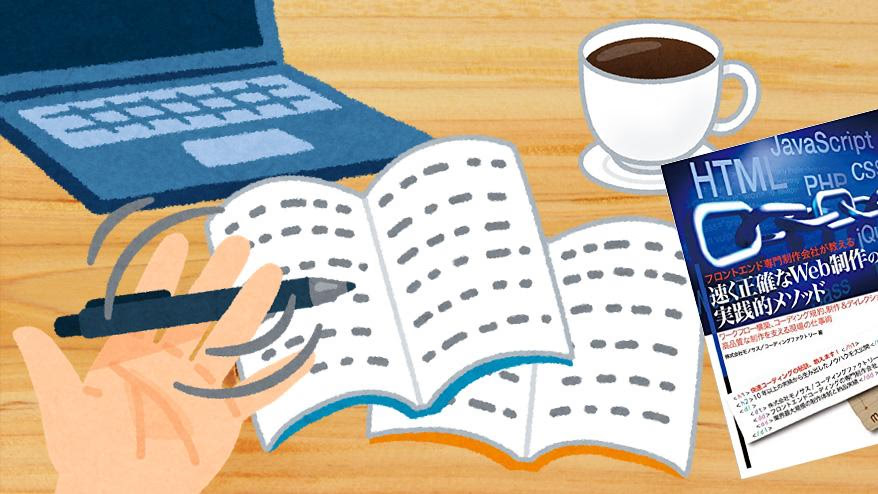In a previous article in this column, we introduced the education system at Coding Factory . Our coders receive a thorough education that teaches them the basics of web coding, but in order to keep up with the ever-advancing nature of web technology, daily self-study is also important.
So this time, we conducted a survey at Coding Factory (CF) about self-study. What do coders study every day, and how do they study?
I'm very curious!
How is everyone studying?
Why did we decide to survey coders about their own learning?
The reason was simply "I wanted to know."
We rarely have the chance to discuss our study methods. I study on my own, but I'm usually so busy that I don't have much time. Everyone around me is in the same situation, but they are constantly acquiring advanced knowledge.
I've always been interested in how people study.
Therefore, we conducted a survey and had the coders answer the following questions:
List of questions
Q1. What field are you studying now?
Q2. How many days a week do you study? How long do you spend studying each time?
Q3. Please tell us your usual study method.
Q4. Please tell us about your own methods and preferences.
Announcement of survey results
Now, let's take a look at the survey results.
Q1. What field are you studying now?
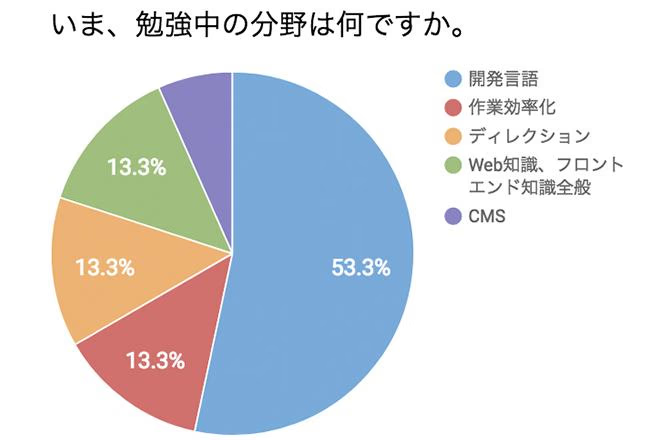
- Development language
JavaScript (ES2015), React, API-related, animation (canvas, webGL), etc. - Work efficiency
EJS, Gulp, looking for methods to speed up development, etc. - Direction: Man-hour calculation and scheduling, task management, project management knowledge, etc.
- General web knowledge, front-end knowledge, offline web applications, performance, HTTP mechanisms, server knowledge, etc.
- CMS, Systems
WordPress, MovableType, back-end development, etc.
As expected, most of the topics are related to development languages such as JS! This is an eternal theme.
We're getting more and more inquiries about APIs and React, and coders are keen to learn about them. We're also interested in animations like canvas and WebGL. The desire to create something cool seems to be a major driving force.
Template engines and task runners such as EJS and Gulp have become essential skills. In fact, using them in real projects has led to mass production of hundreds of pages by one person, improving work efficiency .
Some people said that they collect information about front-end knowledge in general every day, broadly and superficially. They seem to take the approach of digging deeper into things that interest them. There are an increasing number of cases involving integration with CMS and systems , not just front-end, and some people are studying back-end to improve their coding skills.
In addition to coding, CF also has staff who act as production directors to support clients' work, so many of them extend their knowledge to project management and study direction techniques.
Nowadays, the difficulty of the cases we receive is increasing day by day. For CF's coders, accumulating knowledge and improving productivity in order to produce "high-quality work quickly" is a major challenge.
Q2. How many days a week do you study?
How long does it take to study at one time?
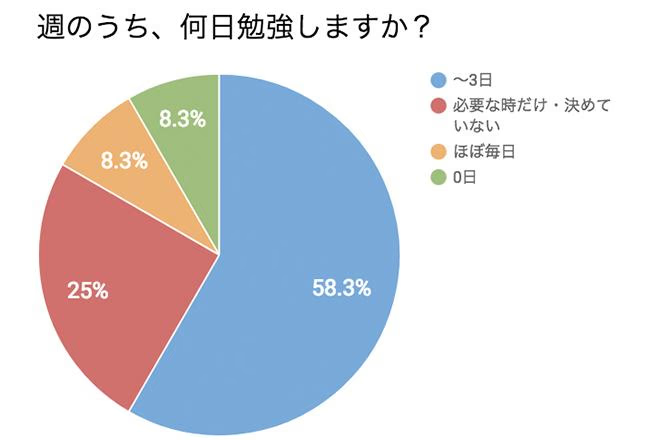
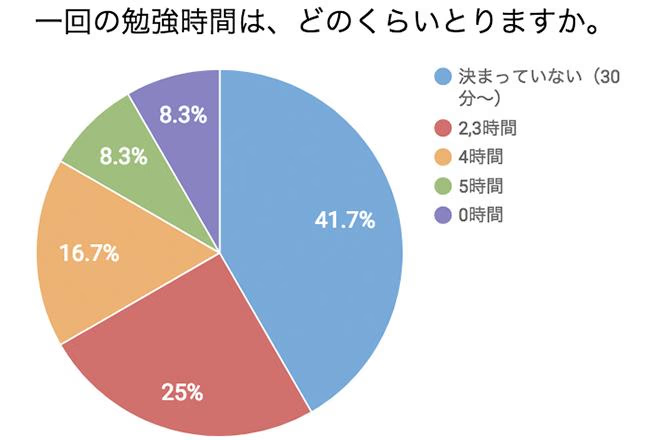
Next, we looked at study frequency. We investigated the number of days per week spent studying and the amount of time spent studying at each session.
The most common answer for the number of days was "up to 3 days," which suggests that many coders have made studying a habit. Some people study hard about 2 days a week, but read books every day on their commute.
Coder said he studies almost every day , but limits his study time to between 30 minutes and 2 hours, and tries not to push himself when he's tired.
When asked about time, the most common answer was "I don't have a set number of study hours." They want to study until they reach a round number, so even if they decide on the number of days, the time changes from time to time.
Overall, each student was able to strike a balance between studying for a short period of time and concentrating for a long time each time, or studying for a short period of time almost every day, so that they could continue studying without straining themselves.
Others say, "When I need it, as much as I need." It seems that by deliberately not making it a habit, your learning efficiency may improve.
What bothers me a bit is that some coders answered "0" for both days and hours . Is that okay?
Q3. Please tell us your usual study method.
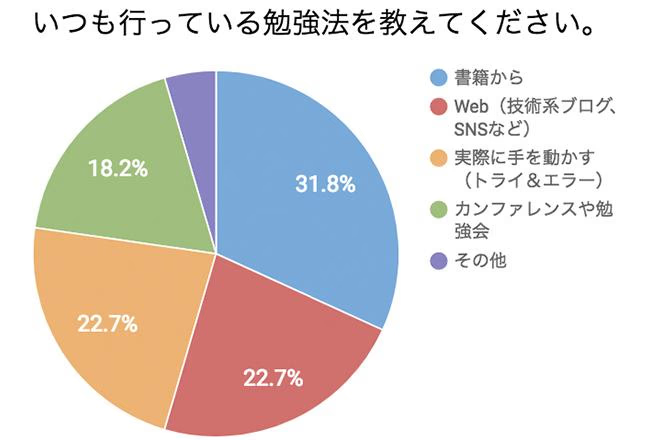
Input-based study methods, which involve absorbing knowledge, can be broadly divided into the following two types.
Book lover
"You can read a book anywhere, and I have a long commute, so I'll use that time to read."
"Unlike searching online, the sense of security and the quality of the answers is different."
A major advantage of book learning is that you can study carefully selected, accurate knowledge in chunks. It doesn't matter if you're in an offline environment, so you can study without any problems even when you're traveling or in a place with a weak internet connection.
Web-oriented (technical blogs, SNS, etc.)
"Because it gathers the latest information in real time."
"You can quickly find out what you're interested in."
A major advantage of the web is that by making good use of web searches and SNS (Twitter, Facebook, etc.) , you can pinpoint the knowledge you want and keep up with the latest information. As long as you have an internet connection, you can view it anytime, anywhere, on any device, and it seems to be effective.
In addition to studying from books and the web, many people also attend experiential learning opportunities such as conferences and study groups . They say that it's easier to absorb the information because they can actually learn in front of you, get their hands dirty in hands-on sessions and workshops, and ask questions on the spot.
Some people said, "Because the fee per session is so high, I don't slack off and can concentrate."
The answer given by the coder who spent zero time studying was " actually doing it (trial and error)." He doesn't set aside any special study time outside of work, as he researches and learns about any questions that come up during his work. That might leave you wondering, but in fact at the monthly coder meetings they give presentations on quite advanced technical skills, so I found it interesting that studying outside of work isn't the only way to learn.
Many coders study in a way that involves output, such as "getting your hands moving," in addition to input. It seems that knowledge gained from books, the web, and study sessions can be effectively acquired by actually trying things out.
Q4. Please tell us about your own methods and preferences.
How to decide what and how to study
- First decide what you want to make, then research it
- Check the content you are going to study, and first identify the type of study method, the volume, and the important points before you start.
Stock up and relearn
- If there is something that interests me, something I can't understand in one go, or something I want to see a diagram for, I take a picture of it and make a note of it in Evernote.
- Even if you come across an interesting web article, don't read it from start to finish, but finish reading it at about step 3, share it on Facebook, and store it. If that word or piece of information appears frequently, read it from start to finish.
If you can't do it, don't force it!
- When you can't think clearly, give up immediately.
- When I feel motivated, I work hard. When I don't, I take a break.
It's fine to just try anything! But if you're stuck on implementing JS for an actual project, or you have to decide what to make first, you can see the goal and efficiently choose what to study and how to study it .
Even if you study habitually using both input and output, it is still difficult to understand everything at the time. The pressure to "understand it all at once" can actually slow down your comprehension.
Many of the CF coders said, "Even if I don't understand it at first, I'll store it and study it again ." Even if you can't understand something for a while, one day you might suddenly understand it. Or you might be able to solve the problem by reading a completely different article. It's important to have a broad perspective and not get too hung up on the one thing you don't understand.
And when you can't do it after all, don't force yourself . Coders are already working at full capacity. When you can't seem to remember something, take a good rest. This is also important for efficient learning.
The important thing is to "not get tired"
After taking a quick look at the survey results, I thought, "Surprise, not many people are trying hard enough."
No, sorry, I mean that in a good way.
For example, even if you say to yourself, "I'm going to study for 3 hours every day without taking a break!", if you are busy with your daily work and don't have time, you will want to prioritize your health. Even if you really try to do it, you may not be able to concentrate on some days. In addition, private plans are also important... the reality is that it is difficult to continue.
However, one of the requirements for being a coder is to constantly increase your knowledge of the web and improve quality.
The important thing when studying in a way that suits you is to "not make it too difficult."
If it becomes too difficult, you might end up hating studying, or even coding altogether.
In order to enjoy coding, it's important not to try too hard.
The coders at Coding Factory are relaxed and work at their own pace, steadily improving their skills every day.
Did you find any useful advice? Please let us know your study methods!
